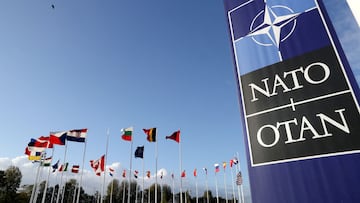What are the consequences if Trump succeeds in pulling the US out of NATO if he wins the election?
Trump has encouraged Putin to invade any NATO ally that “didn’t pay” hours after the Russian president blamed WWII on Poland not bowing to Hitler’s demands.

Donald Trump at a campaign rally in South Carolina over the weekend recounted an alleged conversation with the president of a “big country” and member of NATO to demonstrate his negotiating acumen. He claimed that he was asked if the country in question “didn’t pay,” referring to meeting the alliance’s defense spending target of 2%, would the United States protect them if attacked by Russia.
“No, I would not protect you. In fact, I would encourage them to do whatever the hell they want,” Trump told the crowd was his response. These comments came just two days after Tucker Carlson released an “interview” he conducted with Vladimir Putin in which the Russian president blamed World War II on Poland. Putin claimed that Poland “collaborated” with Hitler but “did not yield to Hitler’s demands” to return Danzig when asked “amicably,” which was the Nazi narrative for why Germany attacked its neighbor, in concert with the Soviet Union, unprovoked.
These most recent comments by the former US president reignited concerns about US commitment to the NATO alliance should Trump return to the White House. During his time in office he denigrated the organization and reportedly talked about withdrawing the United States from NATO.
What are the consequences if Trump succeeds in pulling the US out of NATO if he wins the election?
The possibility of Trump trying to unilaterally pull the United States out of the North Atlantic Treaty Organization (NATO) were he to become president again prompted Congress to pass legislation last year to prevent that from happening. No future president can withdraw the United States from NATO without approval from the Senate or an Act of Congress under the provision included in the annual National Defense Authorization Act passed in December.
However, while Congress has the constitutional power to declare war and appropriate military funding, the US President is commander-in-chief of the armed forces. It is common for presidents to overstep their authority with the use of force, but what would happen in the event Congress wants the nation to get involved in a war, but the president does not?
Clark H. Campbell considered the question in the American University National Security Law Brief and concluded that “congressional power is often overtaxed when Congress seeks to restrain the President from the use of force, but it would be even more taxed to compel military action.”
You may also be interested in: How big are the armies in Europe and which are the biggest?
NATO: US and member states’ commitment to mutual assistance
NATO came into being in 1949, four years after the end of the Second World War to promote peace and security among its member states through collective defense and cooperation. Signatories to the North Atlantic Treaty in Washington DC promised to “safeguard the freedom, common heritage and civilization of the peoples, founded on the principles of democracy, individual liberty and the rule of law.”
The collective pact of mutual assistance was established “to counter the risk that the Soviet Union would seek to extend its control of Eastern Europe to other parts of the continent.” The principle of collective defense as laid out in Article 5 of the treaty is a cornerstone of the alliance.
It commits each and every other member of the Alliance to take the actions deemed necessary to assist any ally that is the victim of an armed attack considering such an aggression as “an attack against them all.” The first and only time it has been invoked was when the United States was attacked on September 11, 2001.






